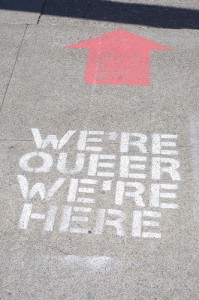This chant is a classic—the classic, really, when it comes to LGBTQ rights. It came to mind as I’ve been grappling with Sedgwick’s assertion that “there are important senses in which ‘queer can signify only when attached to the first person’” (9). Upon first read I was dubious: after all, don’t we as community members strive to “queer” spaces all the time? Spaces cannot self-identify and thus rely on us as third parties to prescribe them identities (already, an important use of queer that does not use the first person.) Another issue: wouldn’t queer individuals want to be recognized and described as queer by others, who would then not be using queer in the third person? It felt to me as though the ability to call oneself queer was simply a use, and that to even begin to construct a hierarchy of queer’s best uses was to undermine and trivialize the word.
Then, I started to really reflect on the significance of the self-identification in this chant. Although not exactly in the first person, the singular of “we” is “I” in the same way that the singular for “they” might be “he” or “she.” So if a singular queer person was to hold up a sign in protest, ze might shout “I’m here, I’m queer.” This is the two-fold assertion that yes, I am actually physically standing here and yes, I am different from you. For a queer person to say this is for zem is reject the systemic erasure that commonly refuses zem name or recognition. Another person, on the other hand, cannot bestow the title of “queer” upon someone else. To call someone “queer” before that individual has first called zirself queer is dangerous “because of the violently different connotative evaluations that seem to cluster around the category” (9). The word “queer” is so rooted in strangeness and violence and hate that it is always an act of reclamation in the first person and always a potential thread in any other tense. I now feel much more amenable to the idea that “anyone’s use of ‘queer’ about themselves means differently from their use of it about someone else,” and that the use of the first person is significant (9). I ultimately contest Sedgwick because I think there are other worthwhile uses of the word, some of which I mention above. I just now see the “important sense” embedded in the first person, and it is amazing for someone who identifies as queer to understand the power in my language.
